How can we interrupt intergenerational transmission of stress by improving parent and child mental health?
UBC Education researchers awarded Peter Wall Institute for Advanced Studies: Catalyst Collaboration Fund grants for climate and nature emergency research
January 5, 2023
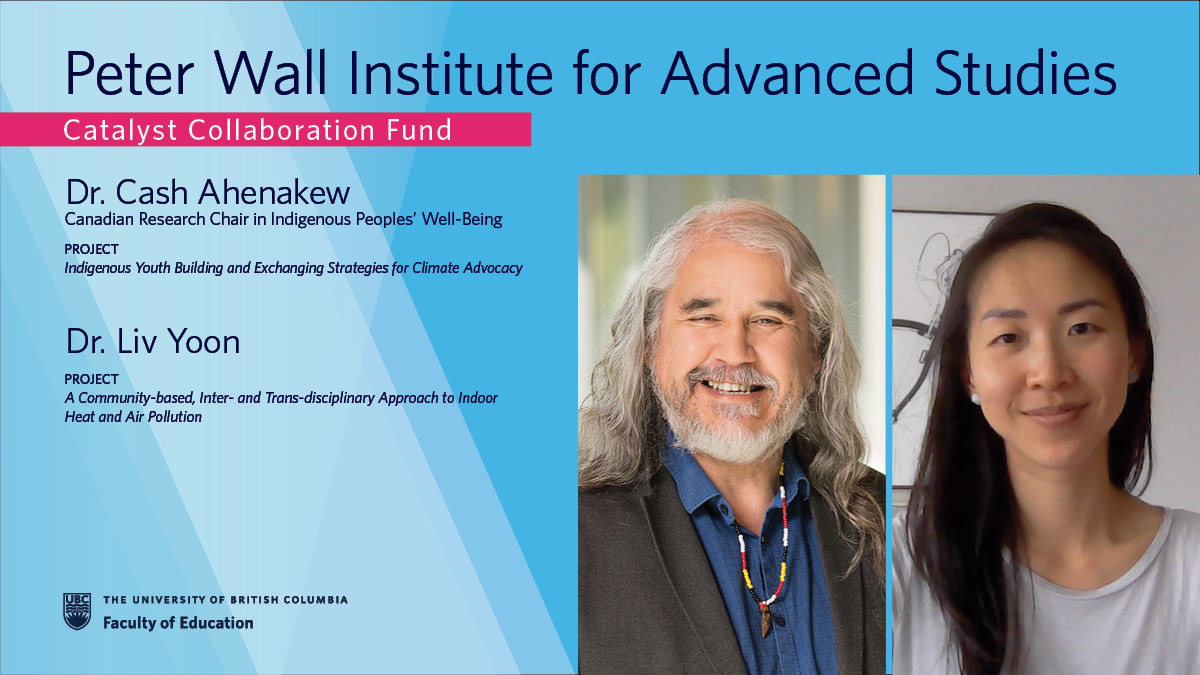
The Peter Wall Institute for Advanced Studies awarded UBC Faculty of Education researchers—Dr. Cash Ahenakew and Dr. Liv Yoon—Catalyst Collaboration Fund (Cycle 2) grants.
The Peter Wall Institute for Advanced Studies (PWIAS) brings together scholars from around the world to engage in research that transcends traditional disciplinary boundaries and explores innovative ways of thinking and knowing. The PWIAS Catalyst Collaboration Fund supports collaborative research projects, events, knowledge translation and mobilization related to the climate and nature emergency.
Dr. Cash Ahenakew
Canadian Research Chair in Indigenous Peoples’ Well-Being
Project: Indigenous Youth Building and Exchanging Strategies for Climate Advocacy
A week-long workshop to be held at the Peter Wall Institute for Advanced Studies in the Spring of 2023 will bring together seven Indigenous youth from communities from North and South America to develop strategies for Indigenous-led advocacy against climate colonialism, especially for international audiences. Principle Investigator Dr. Cash Ahenakew will support the young people to strategically and accountably weave impactful narratives that honour their Indigenous epistemologies and ontologies while shifting dominant responses away from false, simplistic solutions to climate change and toward responses that honour Indigenous land rights, self-determination and the well-being of the earth.
Dr. Liv Yoon
Project: A Community-based, Inter- and Trans-disciplinary Approach to Indoor Heat and Air Pollution
A series of three virtual workshops to discuss experiences, needs and resources around the health impacts of indoor heat and air pollution threats in the Vancouver Lower Mainland area among researchers, city partners, policy makers and marginalized residents. These workshops will subsequently inform a tailored research project to protect vulnerable citizens against negative health impacts of indoor heat and air pollution. This approach entails closely working with—and being guided by—community members directly affected by climate-related hazards.
Universal Design for Learning Fellows Program
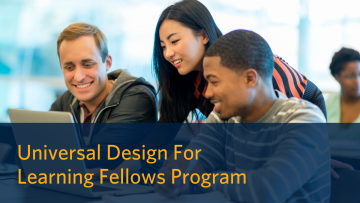
Overview
Universal Design for Learning is a set of principles for course and curriculum development that supports a more inclusive and accessible learning environment for all learners. The UDL Fellows Program will support faculty and staff to develop expertise in UDL through a cohort-based professional development program. It will be comprised of a series of facilitated workshops, online modules, and a project-focused set of activities to help participants use UDL principles to redesign their courses to be more inclusive and accessible. Courses impacted by these projects will benefit students from all backgrounds, not just those with accessibility needs, by providing more options and flexibility through the design of resources, tools, and course delivery.
The goals of the UDL Fellows Program are to:
- Identify and address systemic barriers to equitable learning opportunities, to create and sustain equitable and inclusive campuses (supporting UBC Strategic Plan Strategy 4: Inclusive Excellence and enhancing the accessibility of physical and virtual spaces for students, staff, and faculty).
- Improve access and inclusion in on-campus, online and hybrid teaching and learning environments with a focus on barriers for students with disabilities or other accommodations.
- Develop a network of practitioners with expertise in applying UDL approaches in the design and delivery of courses across a range of disciplines and who will promote awareness of UDL amongst faculty and staff across UBC.
- Develop a range of strategies and resources to help increase support for accessibility in UBC courses and on its campuses.
View the full Teaching and Learning Enhancement Funding (TLEF) description of this program.
Nomination Process (From CTLT)
The 2023 Faculty Fellows Program is limited to 15 project teams from the UBC Vancouver campus. Nominations for the Program will be made by the Associate Deans Academic. Each Faculty will be asked to nominate a project team with a description of the course being proposed for a UDL redesign and a rationale for why the project team and the course have been nominated for the UDL Fellows Program.
Ideally, each faculty project team will include an instructor and a support staff member (from a Faculty Instructional Support Unit or departmental support unit) and have an identified course or learning context around which their project will focus. However, if participation by a Faculty support staff member is not possible, CTLT will provide support for the project.
All project teams who participate in the UDL Fellows Program will commit to implementing UDL approaches in the identified course during the 2023/24 academic year (i.e., Winter Session 1 starting September 2023 or Winter Session 2 starting January 2024).
Faculty of Education Internal Deadline
Submit proposals by 4:00 PM, January 5, 2023.
Faculty of Education Submissions and Ranking Process
- The Faculty of Education invites applications from all instructors; we particularly encourage instructors/coordinators of courses with significant reach (e.g., undergraduate and graduate multi-section courses).
- The Provost’s Office has invited only one nomination from the Faculty of Education and has indicated they will fund the project we nominate.
- Proposals will be ranked by the Faculty of Education TLEF Internal Review Committee.
- The TLEF Internal Review committee will make a recommendation to the Dean’s designate (normally the Associate Dean, Academic).
- The successful proposal will be nominated for the UDL Fellows Program. Provost’s deadline is January 26, 2023.
- Those proposals not nominated for the UDL Fellows Program will be considered for ETS support.
Application Guidelines
Submit a statement (up to 500 words) outlining the following:
- Your team’s previous work with UDL.
- An overview of how your team intends to achieve the goals of the UDL program (see goals listed above).
- Rationale for proposing the course:
- Why is the proposed course a good candidate for this initiative?
- What is the prospective audience? How will students benefit?
- How broad is the reach of this course? Will there be reach/impact beyond the course?
- A plan for sharing what is learned with colleagues in the Faculty of Education.
- Submission link
Evaluation Criteria
- The proposal provides a clear rationale and methodology.
- Objectives align with the fellowship’s goals:
- Identifies and addresses systemic barriers to equitable learning opportunities, to create and sustain equitable and inclusive campuses (supporting UBC Strategic Plan Strategy 4: Inclusive Excellence and enhancing the accessibility of physical and virtual spaces for students, staff, and faculty).
- Improves access and inclusion in on-campus, online and hybrid teaching and learning environments.
- Has the potential to develop a network of practitioners with expertise in applying UDL approaches in the design and delivery of courses across a range of disciplines and who will promote awareness of UDL amongst faculty and staff across UBC.
- Develops a range of strategies and resources to help increase support for accessibility in UBC courses and on its campuses.
- The proposal articulates project outcomes that are well defined and achievable.
- The proposal will lead to resource development or activities that actively engage aspects of equity, diversity, and inclusion, with consideration of strategies to address equitable participation for all students in the implementation of the project.
- There is evidence of the project team’s previous work with UDL and inclusive education strategies.
- The proposal targets enhancement of teaching and learning that benefits a significant number of students directly (e.g., multi-section courses).
- Evidence of value for enrolled students.
- Clear plan for sharing what is learned.
If you have any questions, please contact Dr. Teresa Dobson.
Learning With, From, and Alongside Syilx Community Members

PHOTO: One of the tiny beaded orange shirt pins created by Okanagan School of Education staff. Photography by Amanda Lamberti.
Project Name
Learning With, From, and Alongside Syilx Community Members
Team Members
Danielle Lamb, Kristin Schuppener
Unit
Okanagan School of Education
Project Summary
Members of the Syilx community are leading a series of experiential learning and unlearning sessions for Okanagan School of Education staff, in order to celebrate and share local Syilx histories and connections to the land, culture, and understandings of self in the world.
In the first workshop, held August 9, 2022, Kyla Shields of the Syilx Nation led a beading session in which she shared the local tradition of beading and the history of orange shirts.
Sk’emel Iya’7yulh: The Paddle Journey
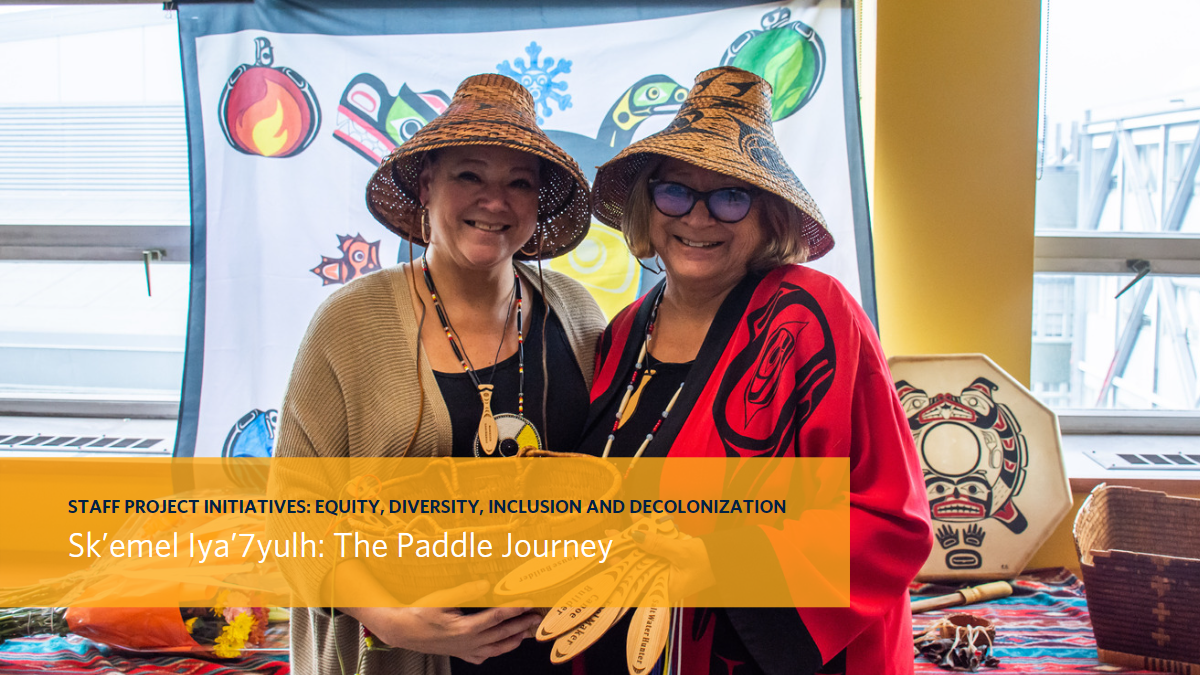
Project Name
Sk’emel Iya’7yulh: The Paddle Journey
Team Members
Lynne Tomlinson, Peyvand Fralick
Unit
Professional Development and Community Engagement (PDCE)
Project Summary
Sk’emel Iya’7yulh (The Paddle Journey) is an interactive educational workshop that teaches the history of Coast Salish People through Elder storytelling and role play.
Sḵwx̱wú7mesh Úxwumixw Elder Yeltsilewet (Faye Halls), daughter of the Late Chief Simon Baker (Khot-la-cha), led Faculty of Education staff on a hands-on journey through history from an Indigenous perspective.
The October 2022 workshop proffered a new understanding of what life was like for Squamish Nation people in the past to present day, covering topics that included Indigenous ways of being and knowing; loss of Indigenous skills, gifts, language, children, culture and life; resilience (i.e., the strength to re-learn and re-teach); natural gifts and talents of individuals; and planting seeds for positive action moving forward.
Queer Competency Training with QMUNITY
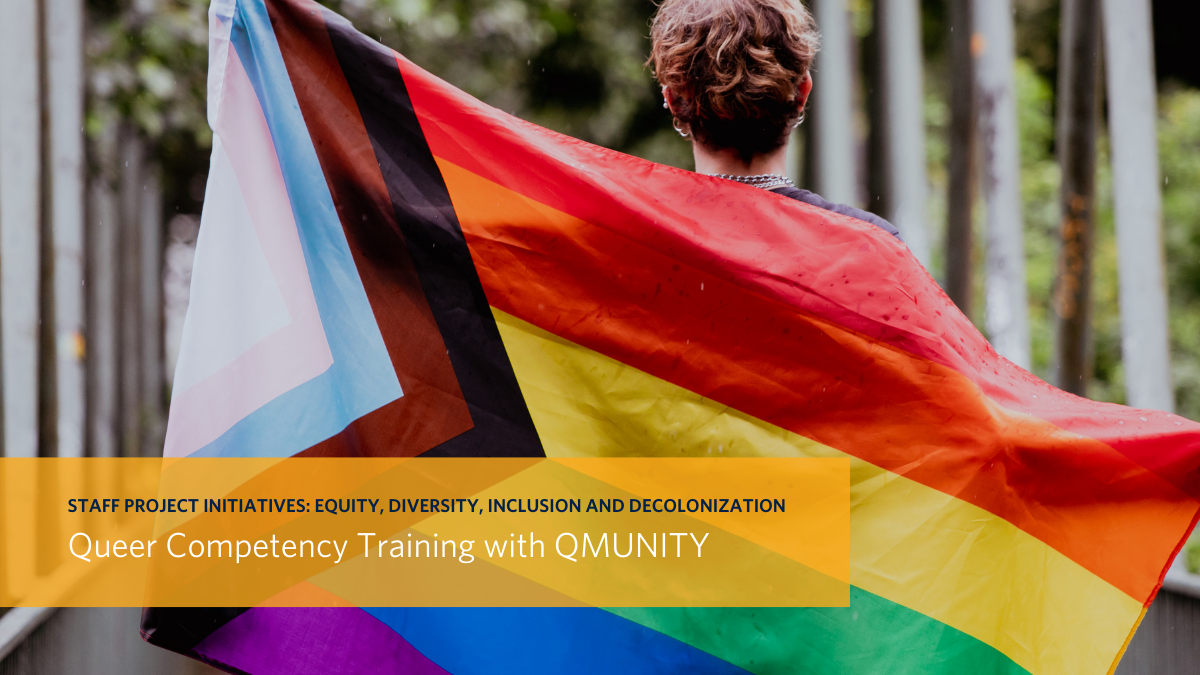
Project Name
Queer Competency Training with QMUNITY
Team Members
Michael Murphy, Vanessa Smith
Unit
Office of the Dean (DNSO)
Professional Development and Community Engagement (PDCE)
Project Summary
QMUNITY—a non-profit organization that works to improve queer, trans, and two-spirit lives—led an experiential workshop, based on its popular Queer Competency Training, at a Faculty of Education staff lunch & learn in October 2022.
The teambuilding lunch and workshop created a powerful learning environment that encouraged participants to explore and ask questions, fostering respect, participation, inclusion and diversity.
Making: Hands-on Inclusive Learning
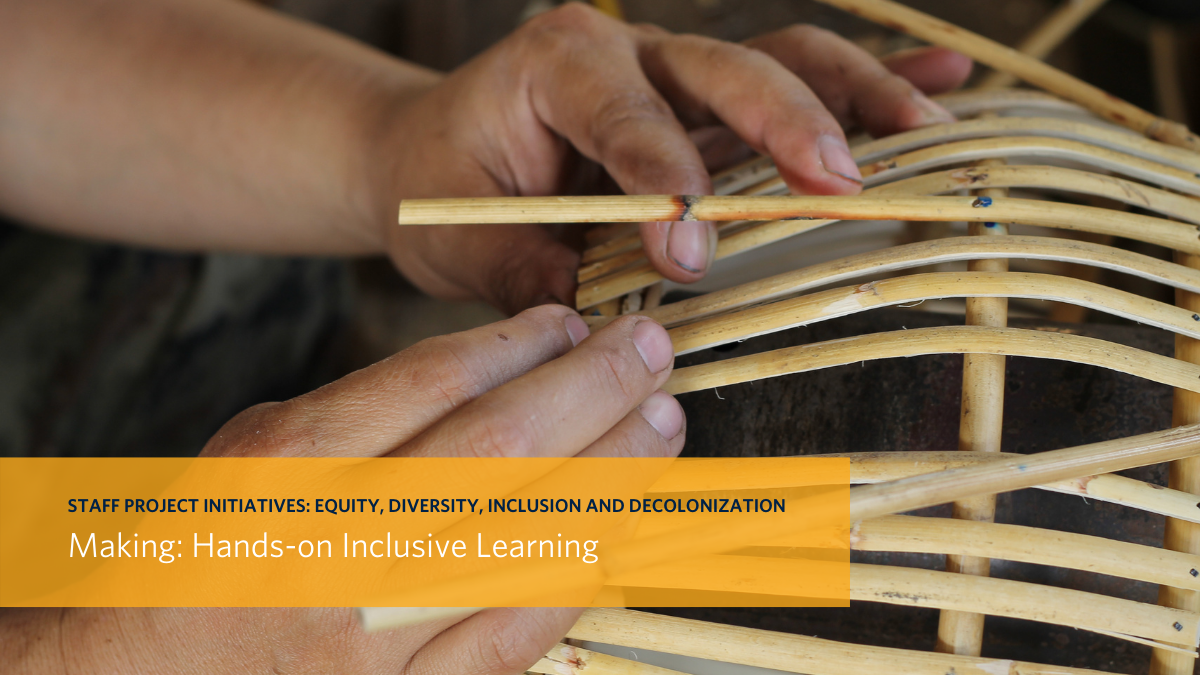
Project Name
Making: Hands-on Inclusive Learning
Team Members
Yvonne Dawydiak, Simone Hausknecht, Dr. Keri Ewart, Dr. Marianne McTavish, Wendy Traas
Units
Teacher Education Office (TEO)
Educational Technology Support (ETS)
Project Summary
It is through the activity of making—and considering the needs of those for whom we make—that we can understand and appreciate more deeply a diversity of perspectives while engaging in and developing a more inclusive community.
On January 31, 2023 a hands-on making workshop and other activities, including a “resource display” co-hosted by the Education Library, will give the Faculty of Education community a different way of thinking about equity, diversity, inclusion and decolonization.
The workshop will begin with a panel presentation by Dr. Keri Ewart, a faculty member in the Master of Educational Technology (MET) program and other invited guests in the field.
Details & Session Agenda
Tuesday, January 31, 2023
In-person participation is limited to 40 due to room size and materials constraints.
- 11:45am (optional) In Person (Scarfe 1007) Resource sharing and snacks co-hosted by our Education Library
- 12:00pm – 12:50pm Hybrid (Scarfe 1007 or via Zoom) Panel: What does inclusive making sound like, look like and feel like? Dr. Keri Ewart, MET & Justin Pezzin, Neil Squire Foundation, will share their perspectives on how we make, who we make for and with whom we make. Following their presentations, we will also hear from some educators engaged in this work. Discussion/Q&A to follow.
- 12:50pm – 1:00pm Transition
- 1:00pm – 2:00pm Concurrent Workshop Sessions
o HYBRID (from Scarfe 1007 in room system or via your own device) Inclusive Making for All: Hybrid 101 session
Join Dr. Keri Ewart for an interactive exploration into some approaches to creating an inclusive hybrid learning or meeting environment using digital tools and a Makerspace mentality. Materials list & Digital tech requirements will be shared upon registration (note: there is no specialized equipment needed to participate)
o IN-PERSON (room TBA) Makers Making Change: Making Assistive Technologies
This active learning experience is designed to help participants learn more about accessibility while participating in a Makerspace to build some assistive devices that will be incorporated into a new adaptive gaming lab at GF Strong. All materials and equipment will be provided.
- 2:00pm Soft Closure – Stick around for some further discussion and resource sharing if you are able. Available resources will also be shared with participants following the session.
Antiracist Images: Screening and Discussing EDID Values in Canadian Workplaces
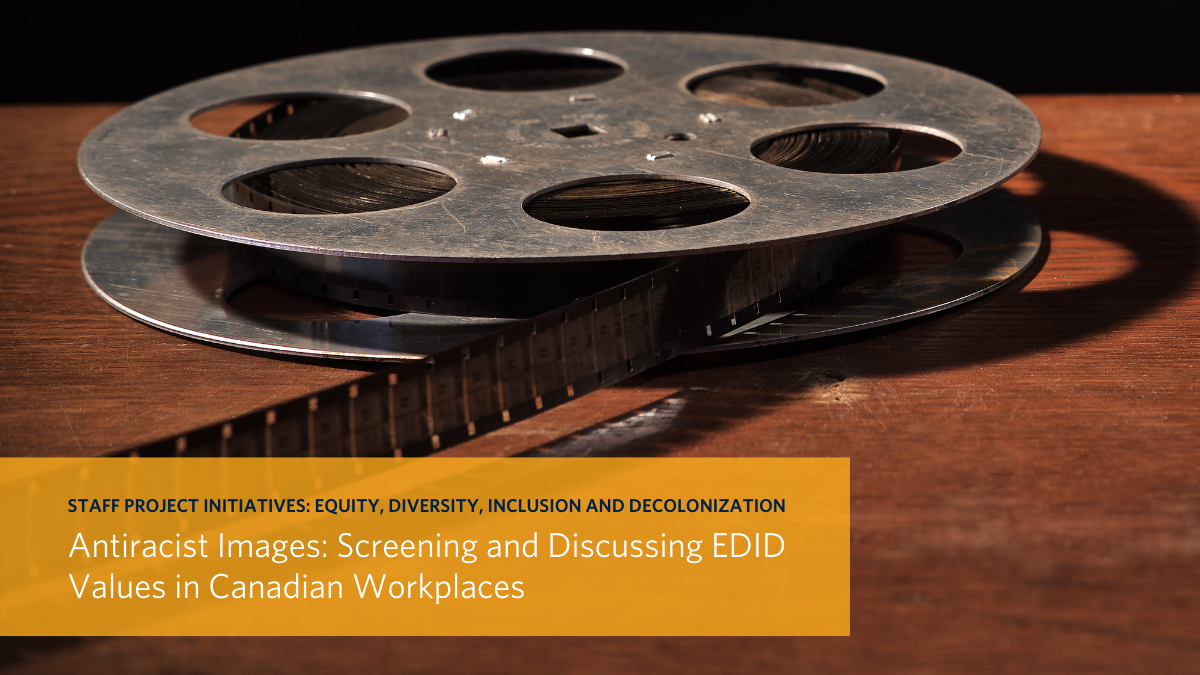
Project Name
Antiracist Images: Screening and Discussing EDID Values in Canadian Workplaces
Team Members
Liliana Castaneda, Natsuko Kamikawara, Simon Lam, Louise Chen
Unit
English Language Institute (ELI)
Project Summary
This lunch & learn workshop series uses film to evoke meaningful conversations about equity, diversity, inclusion and decolonization (EDID) in the workplace.
The first lunch & learn in September 2022 featured a screening and discussion of Sandamini Rankaduwa’s film Ice Breakers (2019), which depicts Josh Crooks’ struggles as a Black hockey player in Canada. In advance of the September film screening, the audience was invited to begin reflecting on the invisible history of Black civil rights in Canada by watching the short film Journey to Justice by Roger McTair (2000).
These screenings invite audiences to think beyond their own racialized experiences, challenge normalized practices in the workplace, and continue these conversations with their colleagues.
Films provided courtesy of the National Film Board of Canada (NFB).
UBC Kinesiology scholars awarded Canadian Foundation for Innovation Grant: John R. Evans Leaders Fund (JELF)
December 1, 2022
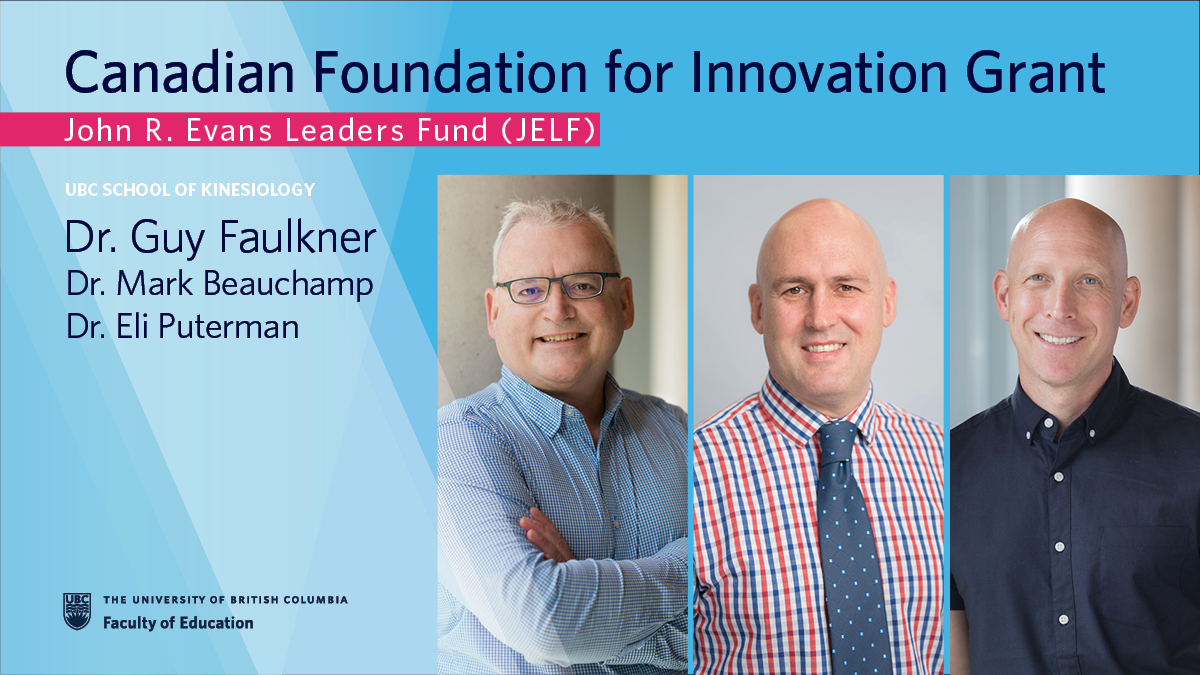
UBC School of Kinesiology scholars were awarded $1.53 million to develop a facility centred on researching physical activity programs in remote populations.
Congratulations to Dr. Guy Faulkner and co-leads Drs. Mark Beauchamp and Eli Puterman on receiving a Canadian Foundation for Innovation, John R. Evans Leaders Fund (JELF) grant along with a complementary funding match by the BC Knowledge Development Fund (BCKDF). The combined $1.53 million award will help in developing the RESPECT (RESearch in Physical activity & Exercise with, by, and for hard-to-reach CommuniTies) Collaboratory facility.
The RESPECT Collaboratory is a centre for developing, assessing, and evaluating physical activity initiatives conceived with, by and for hard-to-reach populations. Its approach emphasizes self-determination by harnessing the potential of individual and community strengths.
The centre will position UBC as a world leader in physical activity research with a focus on hard-to-reach populations. The RESPECT Collaboratory will support the continuum of research from “bench-to-bedside” to community-engaged practice, and it will provide training for exceptional highly qualified personnel (HQP) from numerous disciplines.
Dr. Guy Faulkner is a Canadian Institutes of Health Research-Public Health Agency of Canada (CIHR-PHAC) Chair in Applied Public Health and a professor at the School of Kinesiology. Dr. Mark Beauchamp is a researcher and professor at the School of Kinesiology. Dr. Eli Puterman is a Canada Research Chair in Physical Activity and Health and an associate professor at the School of Kinesiology.